高二英语同步学案第8讲 (必修2复习与被动语态专题)
- 格式:doc
- 大小:194.00 KB
- 文档页数:12

2019-2020年人教版高中英语必修二被动语态复习教案【学习目标】1. 学生能够熟练掌握8种常见时态被动语态的结构、用法及注意事项。
2. 能够熟练并灵活运用被动语态正确做题。
【重点难点】1.重点:熟练掌握8种常见时态被动语态的结构、用法及注意事项。
2.难点:能够熟练并灵活运用被动语态正确做题。
【学情分析】学生能够说出各个时态被动语态的结构,但是做题的时候容易丢掉be动词和过去分词,还有一些注意事项和易错点也是学生容易出错的地方。
【导学流程】一、回顾旧知被动语态的含义、结构。
二、自主学习△8种常用时态的被动语态:1. 结构:由“助动词be + 及物动词的过去分词”构成。
助动词be 有时态、人称和数的变化。
(1) 一般现在时:am/is/are +过去分词。
如:Rice is grown in south China. 华南种植水稻。
(2) 一般过去时:was/were+过去分词。
如:The glass was broken yesterday. 这块玻璃是昨天打烂的。
(3) 现在进行时:am/is/are being +过去分词。
如:The project is being carried out. 这个计划正在执行中。
(4) 过去进行时:was/were/being +过去分词。
如:This road was being built this time last year. 这条路去年这个时候还在修建。
(5) 一般将来时:will be +过去分词。
如:The cars will be sent abroad by sea. 这些汽车将由水路运往国外。
(6) 过去将来时:would be +过去分词。
如:The manager said the project would be completed by the endof the year. 经理说这个工程在年底前将会完成。
(7) 现在完成时:have/has been +过去分词。

Unit 8 First aid I.单元教学目标Ⅱ.目标语言II. 教材分析与教材重组1. 教材分析本单元以First aid为话题,旨在通过单元教学使学生了解相关急救知识,学会根据不同的情况提出肯定或者否定的建议和命令,牢固掌握使用对过去情况和对将来情况的虚拟(尤其是时态上的变化),能在英语口语交际过程中正确对别人提出肯定、否定的建议和命令,能写一篇表示步骤进展(process)的文章,要求能使用正确的表示时间或者逻辑顺序的连接词。
1.1 WARMING UP 通过图片展示各种大大小小的事故:溺水、车祸、火灾、流血、割伤和堵塞等,让学生意识到在生活中我们可能会碰到各种各样的意外,面对这些意外,我们必须学会一些急救知识。
激发学生们学习急救知识的兴趣,从小树立安全意识。
1.2 LISTENING 是发生在医院里的对话,对话双方是护士与受伤孩子的家长,该听力材料语速中等,难度一般。
要求学生在听后能了解大意,并能复述部分内容。
1.3 SPEAKING 是对话训练,要求两个同学相互就家庭内注意人身安全这一话题提出肯定或者否定的建议,要求能够熟练使用should,ought to,must,have to以及它们的否定形式。
除此之外还要求学生能够结合自己实际情况创造语境,相互提出建议。
1.4 PRE-READING是READING的热身活动。
主要围绕为什么急救很重要、如何开展急救和两种不同急救的异同三个方面的话题展开,使学生们在学习课文之前初步了解急救的知识,为阅读的顺利开展打下良好的基础。
1.5 READING是介绍有关急救方面的知识。
第一段通过一个事例an accident 来引出主题:急救知识的重要性。
第二段讲述了在面对危险时最重要的事情是要保持镇定,第三、四、五段则讲述了给予急救知识的原则:DR ABC而且具体阐述。
最后一段则讲述了给予别人急救时的方位。
全文逻辑严密,既有具体的事例,又有说理性的内容,而且文章风趣幽默,用DR ABC五个字母来表明处理紧急情况的五要点:danger, response, airway, breathing, circulation,可谓匠心独运。
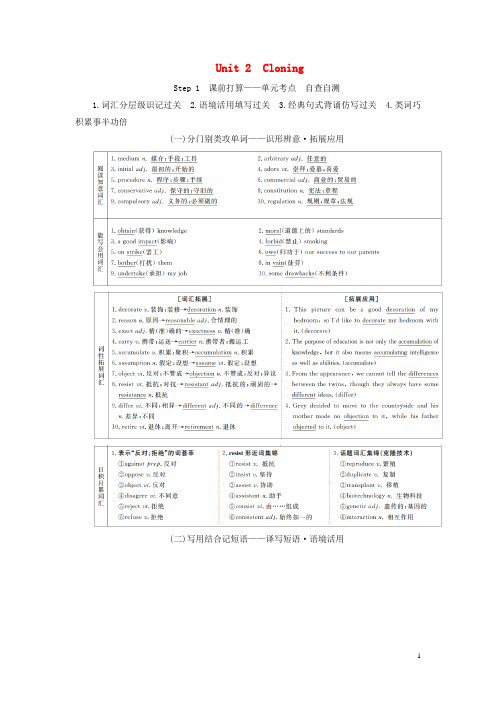
Unit 2 CloningStep 1 课前打算——单元考点自查自测1.词汇分层级识记过关2.语境活用填写过关3.经典句式背诵仿写过关4.类词巧积累事半功倍(一)分门别类攻单词——识形辨意·拓展应用(二)写用结合记短语——译写短语·语境活用(三)仿写活用练句式——经典句型·仿写背诵Step 2 课堂探究——核心考点点点突破1.重点难点考点学通练透2.归纳总结拓绽开阔视野3.方法规律技巧权威点拨4.四平八稳打创高效课堂第一时段Warming up & Reading1.differ vi. 不同;相异[教材原句] Think about how they differ.考虑它们怎样不同。
(1)differ from 不同于……;和……不同differ in 在……方面不同differ with sb. on/about/over sth.在某事上和某人有分歧/异议(2)difference n. 不同之处make a difference to... 对……有影响/起作用tell the difference between A and B分清A和B(3)different adj. 不同的be different from... in... 在……方面与……不同单句语法填空①Chinese eating and drinking habits differ greatly ________ those in the West.②Was it on the matter of finance that they differed ________ each other?③Leaves are found on all kinds of trees, but they differ greatly ________ size and shape.④What you have told me may make a difference ________ my own position.⑤________(differ) from cars, cycling is a means of environmentally friendly transportation.句型转换⑥That fashion is different from country to country may reflect the cultural differences from one aspect.→That fashion ________________________ may reflect the cultural differences from one aspect.[答案]①from ②with ③in ④to ⑤Differing⑥differs from country to country2.undertake vt. 着手;从事;担当[教材原句] It is a difficult task to undertake.这是一项很难完成的任务。

Unit4 Wildlife protection-语法篇通过本节课的学习掌握现在进行时的被动语态的用法。
现在进行时的被动语态一、现在进行时的被动语态的构成:be+being+done。
如:The new building is being built now; I can’t stand its noise.新的大楼现在正在被建造,我受不了它的噪声。
二、现在进行时的被动语态的形式1. 肯定式:主语+be+being+及物动词的过去分词+其他.如:Another bridge is being built over the Yangtze River.长江上正在修建另一座大桥。
2. 否定式:主语+be+not+being+及物动词的过去分词+其他.如:Even though your application is not being checked now, the manager will take it into consideration soon.即使你的申请现在不被审查,但是经理会很快考虑它的。
3. 一般疑问式:Be+主语+being+及物动词的过去分词+其他?如:Is the life of pandas being studied by the scientists?科学家们正在研究熊猫的生活习惯吗?4. 特殊疑问式:特殊疑问词+be+主语+being+及物动词的过去分词+其他?如:Where is the new science lab being built?新的实验室正在哪里建造?三、现在进行时的被动语态的用法1.表示此时此刻正在进行的被动的动作。
如:The baby is being taken good care of.婴儿正在被悉心照料着。
2.表示现阶段正在进行的被动的动作。
如:The environment here is being polluted so badly that all the people can't stand it.这儿的环境被污染得如此严重以至于所有的人都感到难以忍受。

高二英语北师大版选修8Unit 22 导学案语法——被动语态主备人:闫志娟审核人:________ 总第5课时*学习目标:1、掌握被动语态的结构及用法;2、熟练运用被动语态的各种时态。
*重点难点:非谓语的被动语态。
*自学导航:基础知识过关(完成以下被动语态的定义)看谁填的快又准!被动语态是_______的一种特殊形式,表示句子的___________是动作的______者,即动作对象。
它的结构是________+__________。
基础知识导读(10分钟)(请同学们认真阅读大智慧P26-27内容,不懂的地方用红笔划出,并结合以下例句观察总结,然后独立完成以下内容。
)1、One of their most spectacular projects was called surrounded islands.2、Many people thought that permission wouldn’t be given.3、When the wrapping of the Reichstag in golden fabric had finally been completed, the glowingbuilding received…4、Two or three new projects are currently being developed by Christo and his team.知识梳理(10分钟)一、被动语态的使用场合。
1、_________或_________指出动作的执行者时。
2、要关注的是_________而不是动作的______________时。
3、要特别关注动作的___________时,执行者由__________引出。
4、由于某种理由(如为了礼貌、婉转或便于组织句子)而使用被动语态。
5、为了避免一个很长的成分作________时。
6、在文案标题、广告、新闻中。
二、被动语态的形式。

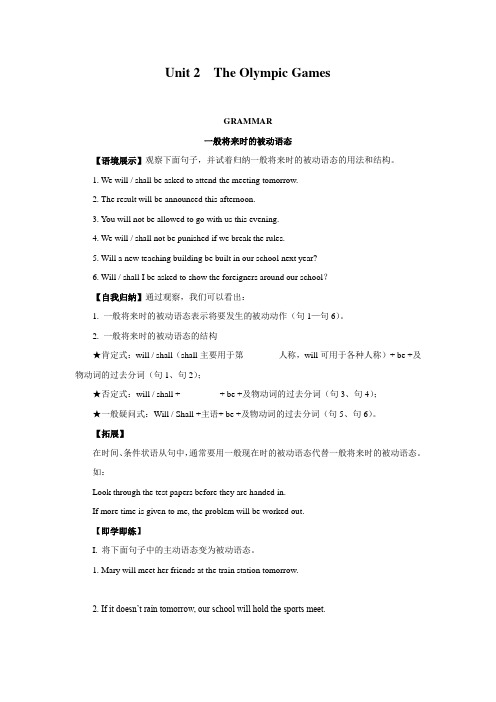
Unit 2The Olympic GamesGRAMMAR一般将来时的被动语态【语境展示】观察下面句子,并试着归纳一般将来时的被动语态的用法和结构。
1. We will / shall be asked to attend the meeting tomorrow.2. The result will be announced this afternoon.3. You will not be allowed to go with us this evening.4. We will / shall not be punished if we break the rules.5. Will a new teaching building be built in our school next year?6. Will / shall I be asked to show the foreigners around our school?【自我归纳】通过观察,我们可以看出:1. 一般将来时的被动语态表示将要发生的被动动作(句1—句6)。
2. 一般将来时的被动语态的结构★肯定式:will / shall(shall主要用于第________人称,will可用于各种人称)+ be +及物动词的过去分词(句1、句2);★否定式:will / shall + ________ + be +及物动词的过去分词(句3、句4);★一般疑问式:Will / Shall +主语+ be +及物动词的过去分词(句5、句6)。
【拓展】在时间、条件状语从句中,通常要用一般现在时的被动语态代替一般将来时的被动语态。
如:Look through the test papers before they are handed in.If more time is given to me, the problem will be worked out.【即学即练】I. 将下面句子中的主动语态变为被动语态。
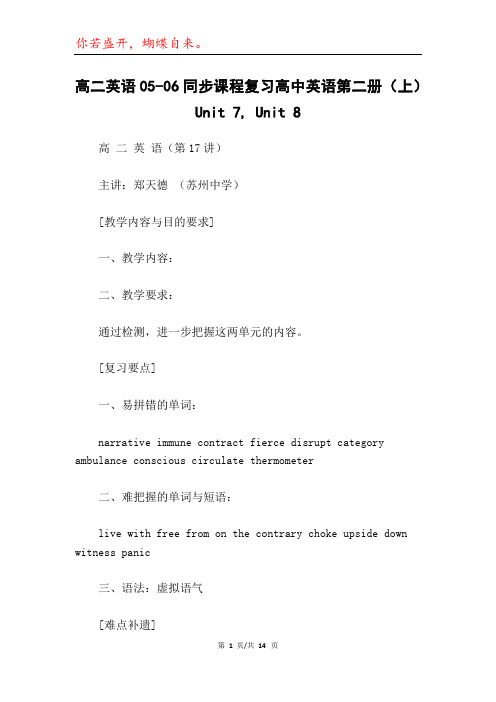
高二英语05-06同步课程复习高中英语第二册(上)Unit 7, Unit 8高二英语(第17讲)主讲:郑天德(苏州中学)[教学内容与目的要求]一、教学内容:二、教学要求:通过检测,进一步把握这两单元的内容。
[复习要点]一、易拼错的单词:narrative immune contract fierce disrupt category ambulance conscious circulate thermometer二、难把握的单词与短语:live with free from on the contrary choke upside down witness panic三、语法:虚拟语气[难点补遗]1、live with:原义:与……住在一起:The little girl lived with her aunt.转义为:忍受,接受某种局面:I don’t enjoy the pain on my back, but I have to live with it.You’ve lost all your money, now you must learn to live with the situation.2、free from 不受…(损害等),远离(不好的事物)He wished to live a life entirely free from troubles.Officials should be free from corruption.Mum kept the TV set free from dirt by covering it with a blanket.3、choke 使窒息,掐死,哽住v.t. The smoke almost choked me.Her voice was choked with sobs.Tom choked his wife last night.v.i. He choked when he ate too quickly.The baby choked on the candy.4、in honor of 向…表示敬意,为庆祝(纪念)…:There is a party tonight in honor of our new president.cf: I have just finished a long poem in memory of John Keats.in memory of … 纪念,只用于已故人物或过去的事情。


Module 2The RenaissanceSection ⅡGrammar非谓语动词:是指在句中不能充当谓语,而是起其他语法功能的动词。
非谓语动词有三种:动词不定式,动名词和分词(包括现在分词和过去分词)。
非谓语动词没有人称和数的变化,但是有语态和时态的变化。
(一)作主语、宾语1.动词不定式或动词-ing形式作主语或宾语时,可用it作形式主语或形式宾语。
如:Eugene's never willing to alter any of his opinions.It's no use arguing_with_him.Nobody thinks it an easy job to_have_done_so_much_in_only_one_day.2.动词不定式和动词-ing形式作宾语比较:◆有些动词后只能接doing,如:admit,appreciate,avoid,consider,delay,enjoy,escape,finish,imagine,keep,miss,mention,practice,risk,suggest等。
如:Lydia doesn't feel like studying abroad.Her parents are old.Bill suggested holding a meeting on what to do for the Shanghai Expo during the vacation.◆有些动词后只能接to do,如:agree,decide,expect,hope,manage,plan,pretend,refuse,threaten,wish等。
如:David threatened to_report his neighbour to the police if the damages were not paid.I can't stand working with Jane in the same office.She just refuses to_stop talking while she works.◆有些动词后接doing和to do都可以,且意思差别细微或没差别,如:begin,start,hate,like,love,continue等;但另一些词差别很大,如:forget,try,remember,mean,stop,regret等。

Section ⅢGrammar——一般将来时的被动语态[思维导图][语法精讲]一、常见结构肯定式主语+shall/will+be done...否定式主语+shall/will+not+be done...一般疑问式Shall/Will+主语+be done...?特殊疑问式疑问词+shall/will+主语+be done...?The new film will be shown next month.这部新电影将在下个月上映。
The meeting won't be held this afternoon.今天下午将不举行会议。
Will the work be finished soon?这项工作很快就会完成吗?When will these books be published?这些书将在什么时候出版?二、常见用法1.一般将来时的被动语态同它的主动语态一样,表示根据计划或安排将要发生的被动动作。
2.在时间、条件状语从句中,常用一般现在时的被动语态代替一般将来时的被动语态。
If I am given enough time, I will go to Hong Kong for my holiday.如果我有足够的时间,我将去香港度假。
3.一般将来时的被动语态表示有固定性条件就有规律性被动结果。
Heated to 100℃,water will be turned into steam.加热到100 度时,水将会变成蒸气。
三、注意问题1.短语动词变为被动时不能漏掉介词或副词。
The orphan will be taken good care of by the old couple.这个孤儿会得到这对老夫妇的良好照顾。
2.含有双宾语的主动句变为被动句时,如果将其中的间接宾语变为被动句的主语,则直接宾语保留不变,反之亦然。
He will tell me a funny story.→I will be told a funny story.→A funny story will be told to me.他要告诉我一个滑稽故事。
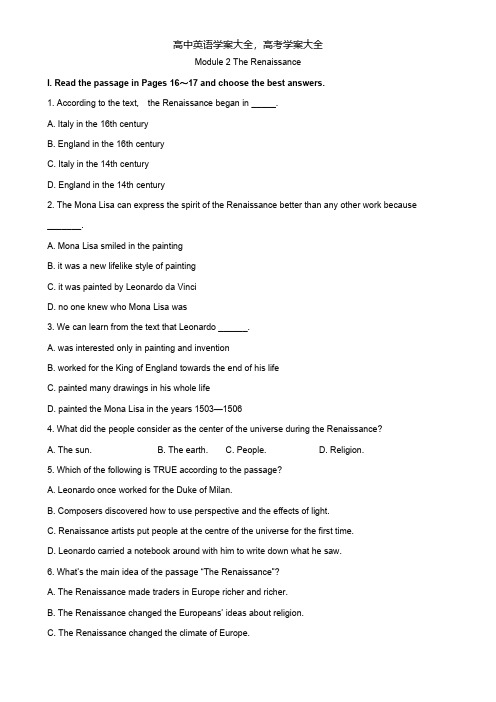
Module 2 The RenaissanceI. Read the passage in Pages 16~17 and choose the best answers.1. According to the text, the Renaissance began in _____.A. Italy in the 16th centuryB. England in the 16th centuryC. Italy in the 14th centuryD. England in the 14th century2. The Mona Lisa can express the spirit of the Renaissance better than any other work because _______.A. Mona Lisa smiled in the paintingB. it was a new lifelike style of paintingC. it was painted by Leonardo da VinciD. no one knew who Mona Lisa was3. We can learn from the text that Leonardo ______.A. was interested only in painting and inventionB. worked for the King of England towards the end of his lifeC. painted many drawings in his whole lifeD. painted the Mona Lisa in the years 1503—15064. What did the people consider as the center of the universe during the Renaissance?A. The sun.B. The earth.C. People.D. Religion.5. Which of the following is TRUE according to the passage?A. Leonardo once worked for the Duke of Milan.B. Composers discovered how to use perspective and the effects of light.C. Renaissance artists put people at the centre of the universe for the first time.D. Leonardo carried a notebook around with him to write down what he saw.6. What’s the main idea of the passage “The Renaissance”?A. The Renaissance made traders in Europe richer and richer.B. The Renaissance changed the Europeans’ ideas about religion.C. The Renaissance changed the climate of Europe.D. The Renaissance had a deep effect on the Europeans’ ideas, business and architecture. Answers :1--5CBDCAII. Language Points1. I find it mysterious, and perhaps even a little disturbing . . .(P15)我发觉它很神秘,或许甚至有点让人不安……①我听到一条令人不安的消息。

姓名,年级:时间:高考英语被动语态专项讲解一、被动语态的构成形式1。
被动语态的基本时态变化被动语态通常为十种时态的被动形式,被动语态由be+过去分词构成,be随时态的变化而变化.以do为例,各种时态的被动语态形式为:1) am/is/are +done (过去分词) 一般现在时2) has /have been done 现在完成时3) am/is /are being done 现在进行时4) was/were done 一般过去时5) had been done 过去完成时6) was/were being done 过去进行时7) shall/will be done 一般将来时8) should/would be done 过去将来时9) shall/will have been done 将来完成时(少用)10) should/would have been done 过去将来完成时(少用)2。
被动语态的特殊结构形式1)带情态动词的被动结构.其形式为:情态动词+be+过去分词。
例The baby should be taken good care of by the baby—sitter。
2)有些动词可以有两个宾语,在用于被动结构时,可以把主动结构中的一个宾语变为主语,另一宾语仍然保留在谓语后面。
通常变为主语的是间接宾语。
例His mother gave him a present for his birthday。
可改为 He was given a present by his mother for his birthday。
3)当“动词+宾语+宾语补足语”结构变为被动语态时,将宾语变为被动结构中的主语,其余不动。
例Someone caught the boy smoking a cigarette。
可改为The boy was caught smoking a cigarette.4)在使役动词have, make, get以及感官动词see, watch, notice, hear, feel, observe 等后面不定式作宾语补语时,在主动结构中不定式to要省略,但变为被动结构时,要加to.例Someone saw a stranger walk into the building。

2020-2021高中英语同步学案:Unit 2 The Olympic Games被动语态(人教新课标必修2)The Studying Design of the Future Passive一. Underline the verbs of the sentences.1. He teaches English in our school. (主动)English is taught in our school by him. (被动)2. We planted many trees last years. (主动)Many trees were planted by us last year. (被动)3. We should plant many more trees. (主动)Many more trees should be planted by us. (被动)二. By observing “the Mayor’s Promise” before the 2012 London Olympics was held,find out the grammar point.The Mayor’s Promise The mayor of London has made promises that something will be done for the 2012 London Olympics. Over 9.3 billion pounds will be spent on the Games. Some stadiums and a new village will be built to the east of London. More hotels will be set up for the visitors …Question ①:In which situations can the Future Passive Voice be used ?Finish Ex.2 on Page13.一般将来时被动语态用法:(一). 注意下面句型:(1) 主语+谓语+宾语。
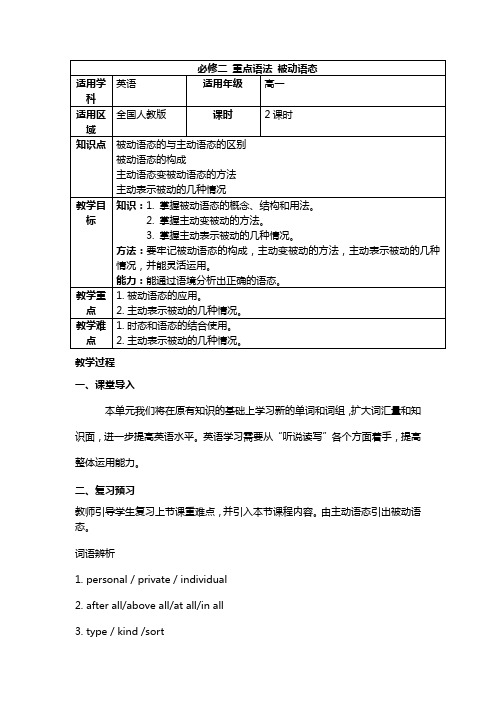
教学过程一、课堂导入本单元我们将在原有知识的基础上学习新的单词和词组,扩大词汇量和知识面,进一步提高英语水平。
英语学习需要从“听说读写”各个方面着手,提高整体运用能力。
二、复习预习教师引导学生复习上节课重难点,并引入本节课程内容。
由主动语态引出被动语态。
词语辨析1. personal / private / individual2. after all/above all/at all/in all3. type / kind /sort4. deal with/do with词形变化1.explore vt. & vi. 勘探; 探测; 探险exploration n. 勘探; 探测; 探险exploratory adj. 勘探的; 探测的; 探索的2. universe n. 宇宙; 世界universal adj. 全体的; 共同的;普遍的;宇宙的3. appear v. 出现; 显现; 呈现appearance n. 出现; 显现; 呈现外表; 外貌; 外观重点单词1. sum n. 金额; 款项; 总数; 总和2. advantage n.优点;优势;有利条件3. goal n. 球门;进球得的分;目标4. signal n. 信号, 手势, 声音, 暗号v. 发信号; 用信号传达; 用信号与……通讯5. arise vi.(arose, arisen)出现;发生重点词组1. in common 共同的;共有的;共用的2. in a/one way 在某种程度上, 从某种意义上说3. watch over 看守; 监视; 照看4. make up 化妆;化装;捏造,虚构(故事,诗等)重点句子1. By the1940s工had grown as large as a room, and I wondered if I would grow larger!2. However,this reality also worried my designers三、知识讲解知识点1主动语态和被动语态的区别:1.Many people speak Chinese.2. Chinese is spoken by many people.1句是主动语态,表示主语是动作的执行者。
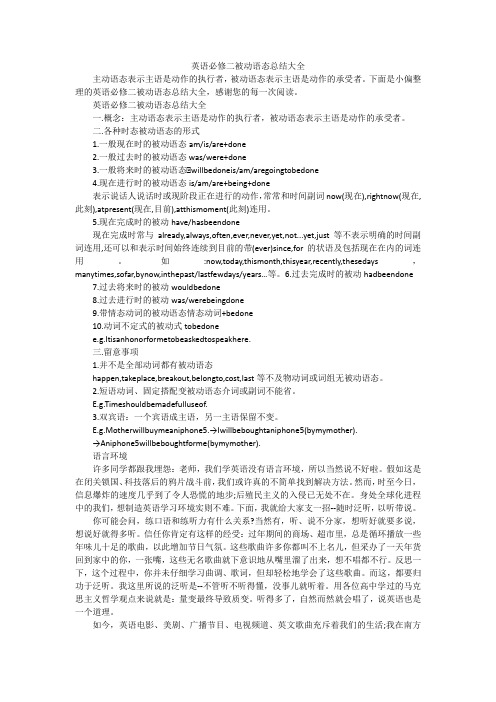
英语必修二被动语态总结大全主动语态表示主语是动作的执行者,被动语态表示主语是动作的承受者。
下面是小偏整理的英语必修二被动语态总结大全,感谢您的每一次阅读。
英语必修二被动语态总结大全一.概念:主动语态表示主语是动作的执行者,被动语态表示主语是动作的承受者。
二.各种时态被动语态的形式1.一般现在时的被动语态am/is/are+done2.一般过去时的被动语态was/were+done3.一般将来时的被动语态⑴willbedoneis/am/aregoingtobedone4.现在进行时的被动语态is/am/are+being+done表示说话人说话时或现阶段正在进行的动作,常常和时间副词now(现在),rightnow(现在,此刻),atpresent(现在,目前),atthismoment(此刻)连用。
5.现在完成时的被动have/hasbeendone现在完成时常与already,always,often,ever,never,yet,not...yet,just等不表示明确的时间副词连用,还可以和表示时间始终连续到目前的带(ever)since,for的状语及包括现在在内的词连用。
如:now,today,thismonth,thisyear,recently,thesedays,manytimes,sofar,bynow,inthepast/lastfewdays/years…等。
6.过去完成时的被动hadbeendone7.过去将来时的被动wouldbedone8.过去进行时的被动was/werebeingdone9.带情态动词的被动语态情态动词+bedone10.动词不定式的被动式tobedonee.g.Itisanhonorformetobeaskedtospeakhere.三.留意事项1.并不是全部动词都有被动语态happen,takeplace,breakout,belongto,cost,last等不及物动词或词组无被动语态。
广州卓越教育机构一对一高二英语同步学案(1期)第八讲Revision of Book Two and Passive Voice必修二复习与被动语态专题一、入门一测用括号里的适当形式完成句子。
1. She is______________________to her children.(devote)2. His_______________in the test was not good enough.(perform)3. Elephants have__________________legs.(power)4. If at first you don‟t_______________,try,try again.(success)5. Don‟t judge by______________,it can be misleading.(appear)6. We‟ll take a voyage of _______________.(explore)7. The jawbone was our most________________discovery.(value)8. When will they finish the __________________of the bathroom.(decarate)9. If you want to sell your old sofa,why not put an_______________in the local paper?(advertise)10. We ______________20 people for the job.(interview)二、查漏补缺------词汇串串烧(一)词性变变变———默写下列常见词。
1、devote v. 奉献--____________adj. 投入的,深爱的--devotion n.2、perform v. 表演,执行--______________n.3、power n.力量;电力;权利--______________adj.强大的4、secceed v.成功;继承----______________n.---- ______________adj.5、appear v.出现;显然是----______________n.外貌6、explore v.探索;探险----______________n.7、value n.价值;v.珍惜----______________adj.有价值的----______________adj.毫无价值的8、decorate v.装饰;点缀----______________n.9、advertise v.登广告----______________n.广告----______________n.登广告者10、interview v.,n.采访;面试---- ______________n.(二)默写下列必考短语。
1、look___________ 调查;2、belong_________属于;3、be ________search of 寻找4、__________reture 作为报答;5、be________war 处于交战状态;6、take_________拆开;7、think highly ________给予高度评价;赞扬;8、add______添加;9、agree_________同意;适应;10、every_________years 每四年;11、compete____________与……比赛;12、work________计算出;制定出;13、pick _______拾起;接收;开车去接;14、carry _______开展;执行;15、deal_______处理;安排;16、make_______弥补;补足;整理;17、after_______毕竟;18、die_______灭亡;逐渐消失;19、protect_______保护…不受…(危险);20、pay attention_______注意;21、come __________being形成;产生;22、have an effect_______对…有影响23、break_______打碎;解体;24、_______________chance偶然;意外地;25、S tick_______坚持;26、__________all最重要的是;首要的是;27、C ome_______(梦想)实现;28、C ome________with提出;赶上;三、破解句型1、…could(not) have done…Frederrick William,the King Of Prussia,could never have imagined that his Greatest gife to the Russian peple would have such an amazing history.普鲁士国王胖特列威廉一世。
怎么也不会想到他送给俄罗斯人的厚礼会有这么一段令人吃惊的历史。
解释:此句中含有“…could(not) have done”结构,又来表示对过去发生的事情的推测、批评、反悔等。
它用在不同的句式中,表达的含义不同。
(1)用于疑问句中,表示对行为可能性的推测。
如:(2)用于陈述句和肯定句,表示与过去事实相反的假设,意为“本来能够去做却没有做”。
否定句表示对过去事实的推测。
如:I stayed at a hotel while in New York.Oh,did you?You could have stayed with Barbara.练习1:①别担心,他们很可能只是忘了打电话。
_______________________________________________________________②你本来至少可以寄张明信片来吧。
_______________________________________________________________2、No…nor+倒装句既不…也不…No other countries could join in,nor could slaves or women.没有别的国家能参加。
奴隶和妇女也不能参加。
解释:“neither/nor+be动词/助动词/情态动词+主语”意为“……也不”,承接前面的否定句,用倒装语序。
如:I can‟t afford a new car,neither/nor can he.我买不起车,他也是。
“so+be动词/助动词/情态动词+主语”意为“……也”,承接前面的肯定句,用倒装语序,如:He is tired and so are you.他累了,你也是。
练习2.①如果你们今晚去看电影,我也去。
_____________________________________________________________________②我以前没有去过上海,我妹妹也没去过。
_____________________________________________________________________3、…with ab./sth.+宾补带着……She turned around and there was an antelope with a sad face looking at her.她转过身看到一只羚羊带着忧郁的神色望着她。
解释:此句可改成:She turned around and there was an antelope which was looking at her with a sad face .“with a sad face looking at her.”为with的复合结构,即with+名词、代词(介词宾语+v.-ing(宾补。
可以充当宾补的还有分词、不定式、形容词、副词及介词短语。
简单总结为:with+宾语+v.ed/v.-ing/to do)作伴随状语或定语。
典例:With some students following behind,he came in.练习3.①站着的时候不要把手插在口袋里。
_____________________________________________________________________②新老板很担心,因为有很多事情要处理。
_____________________________________________________________________4、…v. as if………得像……一样Their personal life was regularly discussed by people who did not know them but talked as if they were closed friends.素不相识的人们经常议论他们的私生活就像是谈论他们的亲密朋友一样。
解释:(1)连词as if =as though,意为“仿佛,像,似乎”。
通常用在be,look,seem,sound,taste,smell及feel等连系动词的后面。
其后的从句可以用陈述语气,但多用于虚拟语气。
如:How wild his white hair looked as if it had been electrified!他的白发十分凌乱,好像触了电似的。
(虚拟语气)She seems as if she is going to cry.她似乎要哭了。
(陈述事实)(2)A s if (though)后面除了跟从句外,还可以跟名词、动词不定式、形容词(短语)、介词短语和分词。
如:He acts as if a fool.他做事像个傻子。
He raised his hand as if to take off his hat.他举起手,好像要取下帽子。
①你像是见了鬼似的。
_____________________________________________________________________②这个男孩四周察看,像在寻找什么东西。
_____________________________________________________________________四、语法“金”典————被动语态(一)知识温故完成下表一些时态的被动结构(以ask为例):(二)知识重构1、为什么要学被动语态?有一天你在美国目的一条路上目睹了一桩交通意外,要向当地警方提供证据,提供事情的经过和死伤和车辆的损毁情况……在此,你不认识里面涉及的人,只是客观地描述情况,即强调了“车”、“伤员”、“死者”等动作的承受者时,就要被动语态。